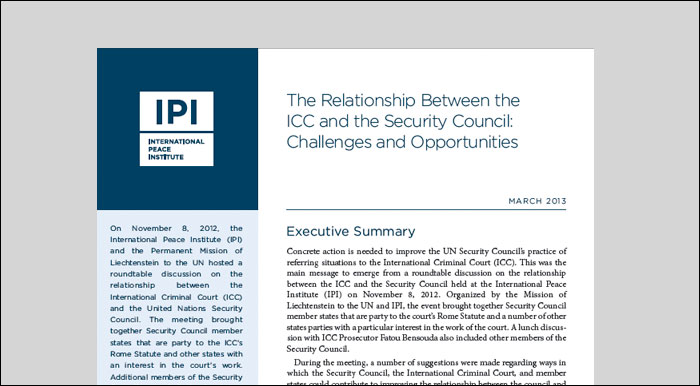 This meeting note summarizes the discussions held at a roundtable event on November 8, 2012 where ICC Prosecutor Fatou Bensouda was the keynote speaker. The roundtable, held at IPI and co-hosted with the Permanent Mission of Liechtenstein, brought together Security Council member states that are party to the ICC and other states with an interest in the Court’s work.
This meeting note summarizes the discussions held at a roundtable event on November 8, 2012 where ICC Prosecutor Fatou Bensouda was the keynote speaker. The roundtable, held at IPI and co-hosted with the Permanent Mission of Liechtenstein, brought together Security Council member states that are party to the ICC and other states with an interest in the Court’s work.
The meeting note gives ten recommendations:
Recommendations for the Security Council and its Member States:
• Devise a coherent accountability strategy, apply consistent standards, and articulate Security Council policy with regard to ICC referrals.
• Make use of the wide range of diplomatic tools at the Council’s disposal to buttress the Court and enforce ICC arrest warrants.
• Use the Council’s powers to impose sanctions and asset freezes to induce cooperation by states.
• Stop imposing limitations on the ICC’s jurisdiction, on the obligations of states to cooperate with the ICC, and on UN sources of funding for the Court in referral resolutions.
• Refrain from endorsing amnesties in situations where crimes punishable under the Rome Statute appear to have been committed.
• Expand the Security Council’s informal working group on tribunals and regularly hold open debates on peace, justice, and the ICC.
• Permanent members of the Security Council should avoid using the veto in situations where crimes punishable under the Rome Statute appear to have been committed.
Recommendations for the International Criminal Court and State Parties:
• States parties should assemble a dedicated caucus to push the Security Council to progressively improve its practice in the area of justice and accountability.
• The Court itself should proactively engage with the Security Council—for example, through the Court’s visits to New York.
• The Court should invite the Security Council to visit to The Hague.







